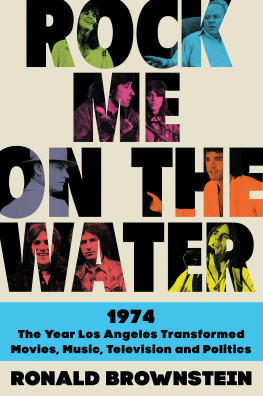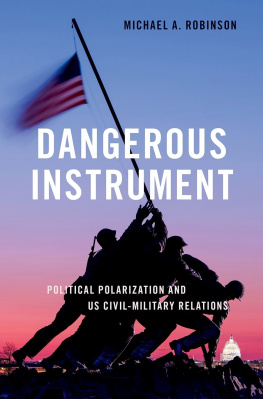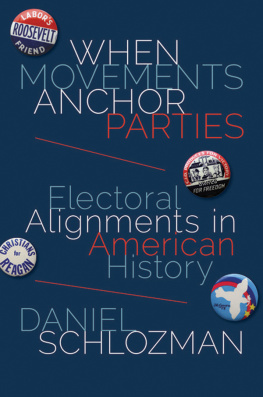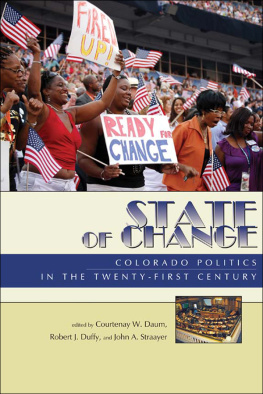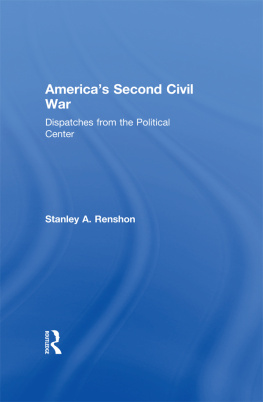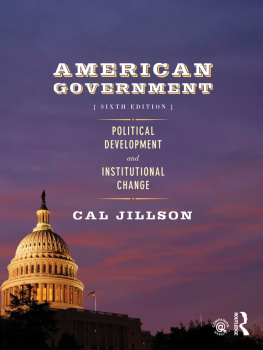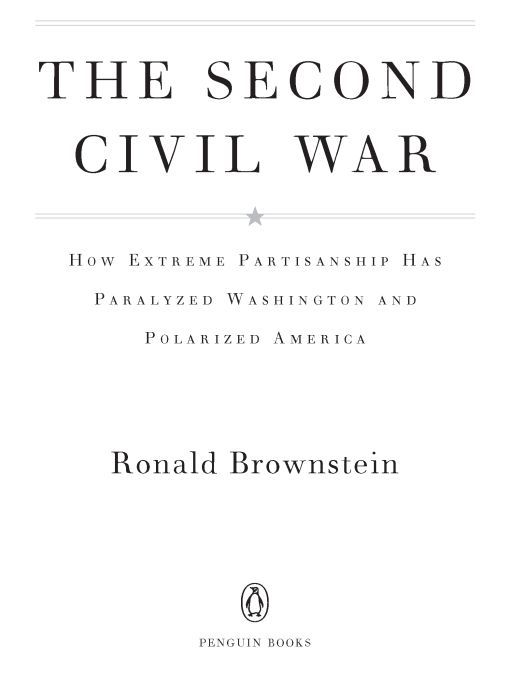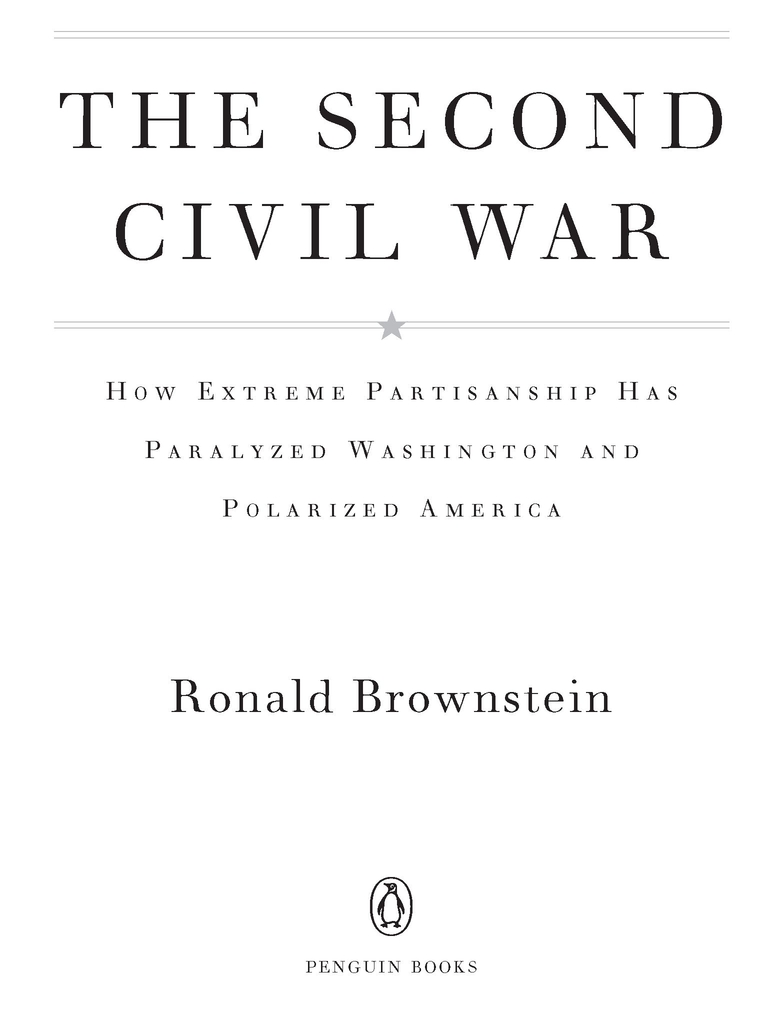Table of Contents
Praise for The Second Civil War
Timely and compelling... In describing the history of partisanship in this country Mr. Brownstein writes with both an authoritative understanding of the political dynamics in Washington and a plain spoken common sense.Michiko Kakutani, The New York Times
Brownstein presents both a biting critique of current political practices and an investigation into their origins.
Art Winslow, Los Angeles Times
Provocative.Alan Brinkley, The New York Times Book Review
Brownstein knows what hes talking about.
Jonathan Yardley, The Washington Post
Brownstein eloquently laments the consequences of [hyperpartisanship]... and offers some fascinating remedies.
Mort Kondracke, Roll Call
An engaging and insightful analysis of an important subject that should be read by all who care about the nations political health.
Claude R. Marx, The Washington Times
[The Second Civil War] lays out a complex history with lucid precision, painting a damning portrait of contemporary politics thats sure to provoke and captivate readers.
Publishers Weekly (starred review)
Astute examination of a stymied system.Kirkus Reviews
PENGUIN BOOKS
THE SECOND CIVIL WAR
Ronald Brownstein, formerly the chief political correspondent and columnist for the Los Angeles Times, is political director of Atlantic Media Co., publishers of The Atlantic Monthly, National Journal, and The Hotline. A frequent political commentator on both network and cable television, he was named a finalist for the Pulitzer Prize for his coverage of the 1996 and 2004 presidential elections.
For Eileen, my beautiful reward,
and for Taylor and Danny, my boys of summer
PREFACE
A DAY IN JUNE
After two terms as Americas first president, George Washington used his farewell address to preach the benefits of unity and warn his young nation about the dangers of permanent alliances with foreign powers. Dwight Eisenhower, in his farewell address after his two terms in the White House, urged Americans to restrain the unaccountable power of the military-industrial complex.
When Republican Representative Tom DeLay of Texas retired under fire in June 2006 after nearly twenty-two years in Congress, he chose to warn against a different threat: too much cooperation between the Democratic and Republican parties.
This might not have seemed a pressing danger to many in the Capitol or anyone around the country watching the evolution of American political life over the past several decades. On most issues, the two parties now spend most days at each others throats. On both sides, the number of legislators who seek to build alliances across party lines, or even dissent from their own party on key votes, is much smaller than a generation ago. Reversing the famous dictum of Carl von Clausewitz, in contemporary Washington politics often seems the extension of war by other means.
DeLay could claim some credit for that condition. A former pest exterminator and Texas state legislator from Sugar Land, Texas, outside of Houston, he was first elected during Ronald Reagans landslide victory in 1984. Intently religious and devoutly conservative, DeLay always recoiled from the conciliatory, deal-making style that House Republican leaders, led by Bob Michel of Illinois, applied to their relationship with the Democratic House majority in the 1970s and 1980s. But DeLay was also a skilled practitioner of practical politics, accomplished at building the alliances with other members that provide the foundation for advancement in the House. In 1989, DeLay placed a bad bet when he managed the losing campaign of moderate Ed Madigan against Newt Gingrich, the leader of young House conservatives, for the position of minority whip. But DeLay rebuilt enough support to defeat a moderate as secretary of the Republican conference in 1992. And when Republicans gained control of the House and Senate in 1994, DeLay won the whip job himself. (In the process, he defeated the preferred candidate of Gingrich, who had advanced to speaker when Republicans gained control.) When Gingrich stepped down as speaker after the disappointing Republican losses in the 1998 election, and his successor Bob Livingston also resigned amid a personal scandal, DeLay demonstrated his rising power by engineering the election of Illinois Republican Denny Hastert. Four years later, when fellow Texan Dick Armey stepped down as House majority leader, the number two position in the House leadership, DeLay replaced him without opposition. Hastert was never the DeLay puppet some believed, but there was no question that DeLay exerted at least as much influence as the speaker over the direction of the Republican majority in the House.
DeLay operated with a broad vision and a precise attention to detail. He worked relentlessly to tighten the links between the Republican majority and the business community by providing the latter greater access and ability to influence legislation, but he also pressured them to tilt their political contributions more toward the GOP, and to hire more Republicans as lobbyists. Inside the House, his principal priority was to maximize Republican unity and minimize opportunities for Democratic influence. DeLays overriding goal was to advance the most conservative agenda possible in a manner that framed the differences between the parties as sharply as possible. He did not fear passing legislation on razor-thin party-line votes; indeed, it often appeared that he preferred bills that pushed to the right so far that they attracted only the bare minimum of votes required to pass. Anything less meant the legislation conceded too much to those resisting the conservative agenda, not only Democrats but moderate Republicans. He was like a meat cutter who prided in his ability to slice closer to the bone than anyone else.
DeLay succeeded to a remarkable extent in imposing his vision. Even though House Republicans operated with a narrow margin of majority throughout DeLays years in the leadership, they moved their agenda through the institution much more smoothly than Democrats had with larger margins in the years before the GOP takeover. DeLay was so central to those efforts, he earned the nickname the Hammer for his ability to nail down winning coalitions.
In June 2006, though, DeLay seemed to be leaving the House one step ahead of an angry mob. Over the years his hardball tactics had prompted several rebukes from the House Ethics Committee. In the months before his resignation, several of his former aides pleaded guilty to various offenses in an ongoing investigation centered on Republican lobbyist Jack Abramoff, who had earned millions of dollars in fees from Indian gambling interests, and had shared the wealth in the form of contributions and overseas trips directed primarily toward Republican legislators. Questions continued to swirl around DeLays own relationship with Abramoff, who pleaded guilty himself to a series of charges and announced his intention to cooperate with prosecutors five months before DeLays speech. More pressingly, a prosecutor in Texas had indicted DeLay, accusing him of laundering corporate money through the Republican National Committee to help elect a Republican majority in the Texas state legislature in 2002. (DeLay intended the new majority to redraw the states congressional districts in a way that allowed Republicans to win more seats, which is exactly what the legislature did the next year.) The combination of the Texas indictment and the Abramoff investigation led restive House Republicans to demand that DeLay step down as majority leader. When he was stripped of that perch, DeLay decided to walk away from the House altogether, and he resigned his seat.


